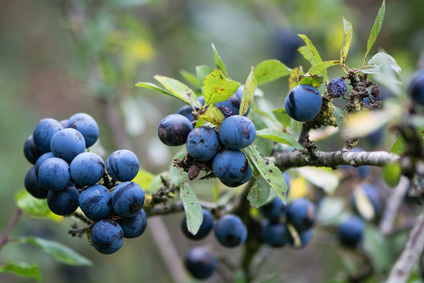Blackthorn Tree

How would you like to learn more about the blackthorn tree? Read on for tips on how to identify it and its typical characteristics; how to spot common diseases and pests and the best way to prune and care for blackthorn.
Blackthorn is a deciduous bush-type thorny tree. Well-loved for its glorious spring blossom, this tree is UK native and produces the sloe fruit, often used to make gin and other popular drink and foodstuffs such as wine and preserves. Prunus spinosa as it is known scientifically can grow up to 7 metres in height and will live up to 100 years. Not to be confused with hawthorn, the blackthorn does produce very similar white blossom, but flowers earlier around April and before its leaves appear, whilst hawthorn, or May flower, blooms in May and after its leaves come out.
The bark of the blackthorn is smooth and dark brown. The timber is very tough and used to make riding or walking sticks as well as Irish shillelaghs.
General Facts
| Known as | Blackthorn, sloe, sloe plum, buckthorn, bullace, skeg, snag |
| Latin name | Prunus spinosa |
| Location | UK native, Europe, Russia, Western Asia |
| Foliage | Deciduous |
| Lifespan | Up to 100 years |
Characteristics
| Height | Up to 7 metres |
| Spread | Up to 4 metres |
| Appearance | A small, thorny deciduous tree displaying beautiful spring blossom and black-purple twigs. |
| Leaves | Leaves are dark green and ovate, slightly wrinkled and toothed, tapered at the base and toothed at the tip. |
| Flowers | Small white flowers appear in clusters on short stalks in early spring before the leaves. |
| Fruit | Flowers are insect pollinated and develop into blue-black fruits called sloes. |
| Found in | Scrub, copses, woodland, roadside hedging |
Conditions
| Ideal soil | Moist but well drained chalk, clay, sand or loam |
| Soil pH | Acid, alkaline, neutral |
| Aspect | North, south, east or west facing |
| Exposure | Sheltered or exposed |
Threats
| Pests | Aphids, caterpillars, bullfinches |
| Diseases | Silver leaf, blossom wilt, Taphrina pruni |
Blackthorn Trees and Wildlife
Blackthorn is a rich source of pollen and nectar for bees during the spring with its early flowering blossom. Caterpillars of numerous moths enjoy its green leaves, including the common emerald, the small eggar, the swallow-tailed and yellow-tailed moths and the magpie. The black and brown hairstreak butterflies are also fans.
Birds enjoy nesting in blackthorn thanks to its thorny protection and abundant supply of caterpillars, and its autumn fruits.
Blackthorn Tree Symbolism and History
Blackthorn has long been associated with witchcraft and it is believed that witches’ wands were crafted from blackthorn wood.
The Importance of Blackthorn Trees
Blackthorn wood is tough and hardwearing and traditionally used in the crafting of walking sticks. As it burns well, it is commonly used as firewood.
Blackthorn is a popular hedging shrub and widely used in wildlife gardens as it attracts an array of birds and insects.
Sloes are used in the making of foods and beverages such as gin, wine and preserves.
Caring for a Blackthorn Tree
Not a lot of pruning is needed for the mature blackthorn tree unless you are using it as a hedging shrub, in which case you’re going to need to tidy it up on a regular basis.
The younger blackthorn benefits from regular pruning so that its framework stabilises well and the canopy becomes nice and thick.
It’s important to carry out blackthorn tree pruning at the right time of year so as to ensure its health is maintained. Where issues such as silver leaf have taken hold, it is essential that pruning is only undertaken in mid-summer. Otherwise, the best time to prune a blackthorn tree or hedge is during the winter.
Your best route really is to call in professional help from qualified tree surgeons who know precisely when and how to take care of your blackthorn tree.
For more about Blackthorn tree pruning, follow this link.
If you have a blackthorn tree that requires skilled care and attention, why not talk to Tree Works? As extensively qualified and long term experienced tree surgeons, we can offer in-depth skill and knowledge across all aspects of blackthorn tree care. For a free, no-obligation quotation, call us on 07781 416 354 or get in touch here.

